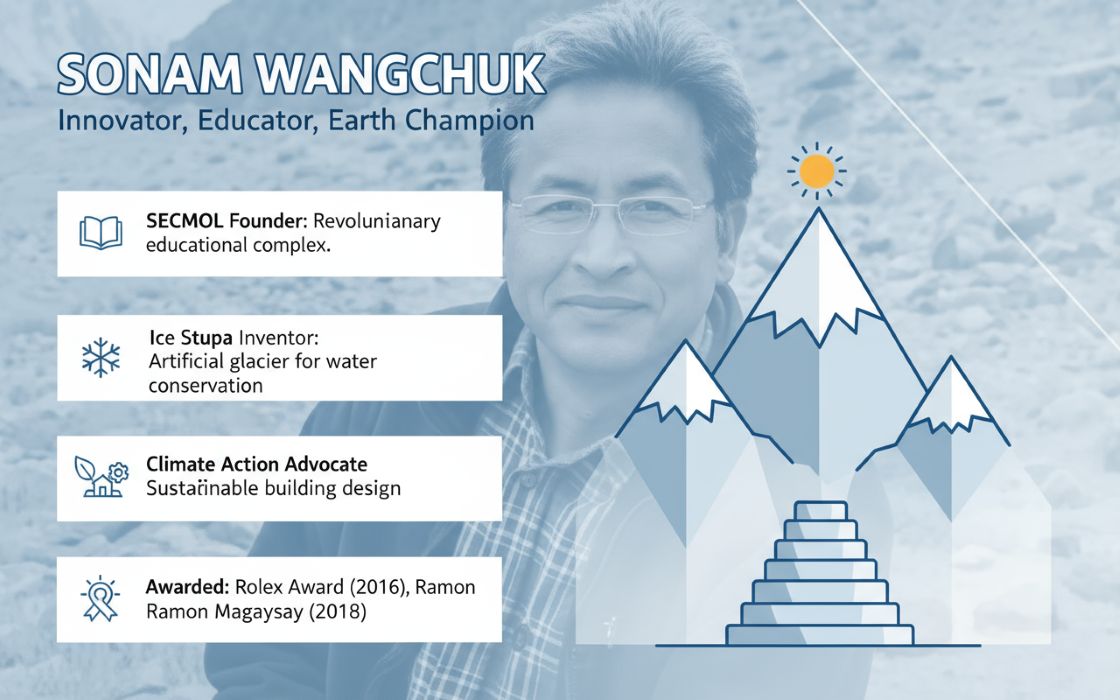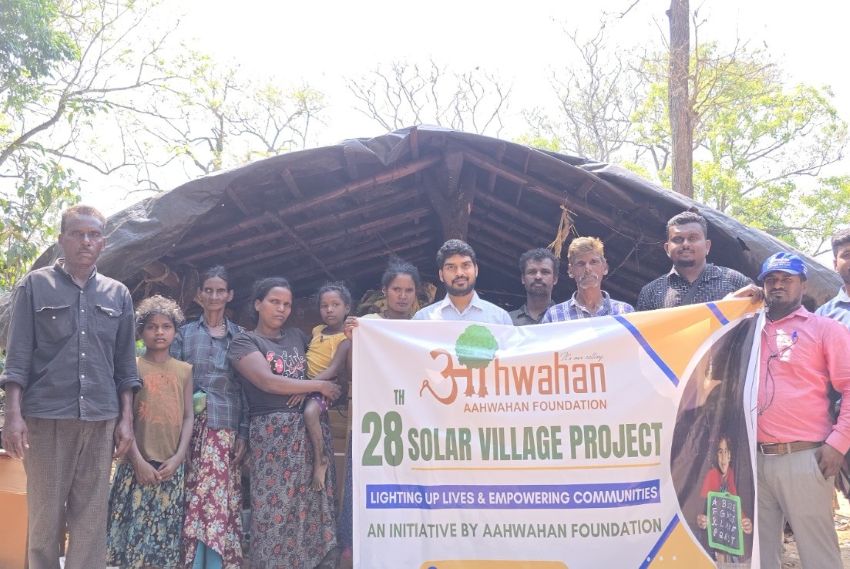As India sets its sights on a net-zero future, the urgency to build a skilled, future-ready workforce has never been greater. At the Climate Action and Sustainability Conference & Awards (CASCA’25), a landmark panel discussion—“Sustainability Courses & Green Jobs: Bridging the Skills Gap for a Greener Future”—brought together thought leaders from government, industry, and civil society to chart a roadmap for empowering India’s youth as the engine of the green economy.
Moderated by Mr. Ashish Jha, Founder, TheCSRUniverse, the session was a clarion call for action, collaboration, and innovation. The panelists—representing diverse expertise—shared a vision where green skills are not niche, but mainstream, and where every young Indian, regardless of geography or background, has access to opportunities in the sustainability sector. 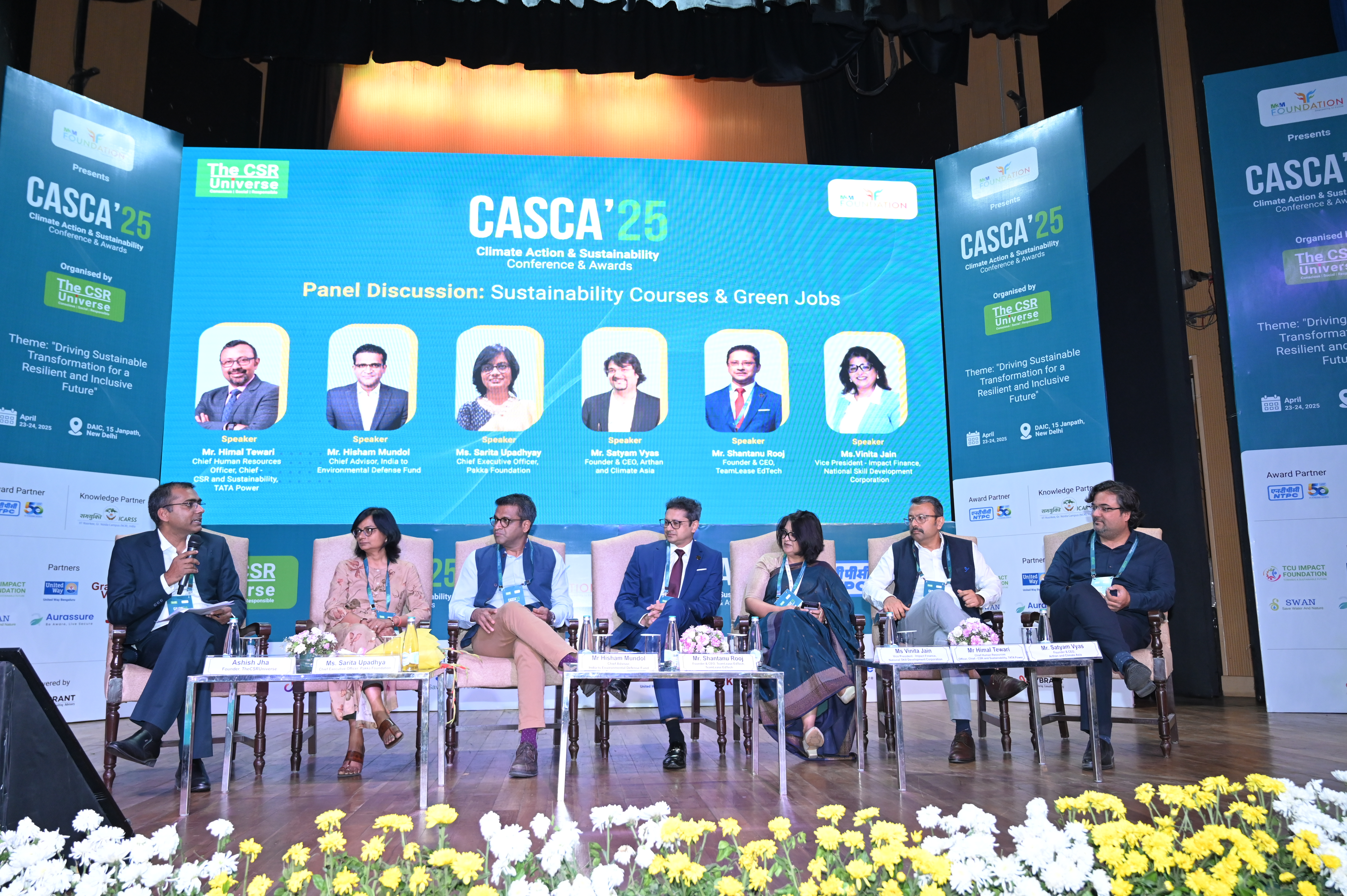
From Buzzword to Blueprint: Redefining Green Jobs
Ms. Sarita Upadhya, CEO of Pakka Foundation, set the tone by urging stakeholders to move beyond viewing green jobs as a mere buzzword. “If we don’t bring rural youth into the fold of green skilling, we miss the majority,” she emphasized. Her foundation is pioneering efforts in Ayodhya, integrating global green technologies with local skilling models. By embedding green elements into traditional vocational courses—such as electrician or fitter training—the foundation is not only upskilling youth but also raising awareness about green career pathways in semi-urban and rural areas. “Contextualized green curriculum and industry integration are key to making green jobs accessible and aspirational,” she added.
Talent as Climate Capital: Bridging the Awareness Gap
Mr. Hisham Mundol, Chief Advisor, India, Environmental Defense Fund, highlighted the scarcity of climate-literate talent as a critical bottleneck. “Talent is as crucial a gap as finance and technology,” he asserted. Mr. Mundol pointed out that even sophisticated sectors like investment and finance in India lag behind their global counterparts in climate awareness. To address this, EDF’s Climate Corps Fellowship trains master’s students and places them within companies and government departments for hands-on learning in carbon markets, energy modeling, and renewables. “We need to build a pipeline of climate-literate professionals across all sectors,” he said.
Structuring the Skilling Ecosystem: Policy and Practice
Mr. Shantanu Rooj, Founder & CEO, TeamLease EdTech, shared a striking statistic: 12,000 applications were received for just 30 seats in an MBA in Sustainability Management. While this reflects rising interest, Rooj cautioned against complacency. “There is no national structure or framework defining green jobs,” he noted. He proposed actionable solutions:
- A national dashboard of green job demand by sector
- Embedding green skills in the NEP 2020 framework
- Green apprenticeships
- Utilizing CSR and PMKVY funds to create Green Labs in ITIs and polytechnics
“Without policy alignment and incentives, our efforts will remain disjointed,” Mr. Rooj warned, underscoring the need for a coordinated approach.
Catalyzing Change from K-12 to Campus
Ms. Vinita Jain, Vice President – Impact Finance, National Skill Development Corporation (NSDC), championed early intervention. “We are bringing green education into K-12 through NEP 2020,” she shared. NSDC is rolling out Future Skills Centres, offering industry-led, subsidized green courses in universities and schools. Courses in cloud computing by Amazon and app development by Apple, priced at just ₹6,000, are already live in over 20 universities. “We’re not just enabling awareness, we’re engineering aspiration,” Ms. Jain said. NSDC has identified a demand for over 2 million green jobs in the next three years, and the focus is on creating viable, low-cost training pathways that are self-sustaining. 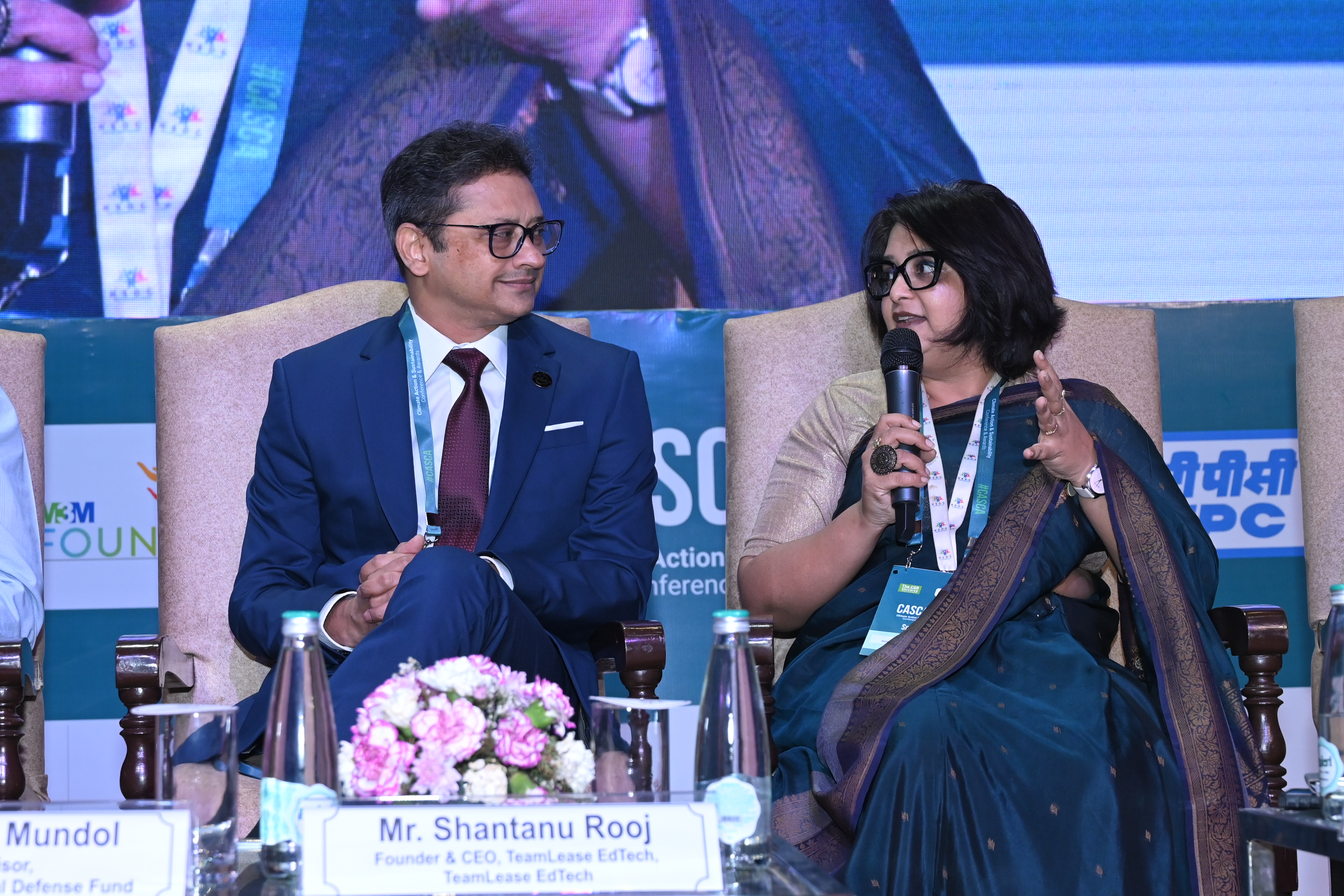
The Industry Lens: Demand, Gaps, and Horizontal Skilling
Mr. Himal Tewari, CHRO and Chief – CSR and Sustainability, Tata Power, offered a pragmatic industry perspective. “All jobs in the next decade will be green jobs,” he asserted. However, he flagged a critical challenge; while vertical specialist skills exist, the horizontal integration of sustainability across roles like logistics, HR, and IT is lacking. Tata Power’s initiatives include:
- Skilling over 3 lakh youth in solar, wind, and battery technology
- Launching India’s first hydrogen lab in partnership with SCGJ
- A digital sustainability tool used by 11,000 employees to track personal eco-impact
“Green skilling is not a fad—it’s a mainstream necessity,” Mr. Tewari stressed.
From Theory to Value Chain Integration
Mr. Satyam Vyas, Founder & CEO, Arthan and Climate Asia, underlined the need to fix the entire green employment value chain. His organizations have developed global climate finance fellowships but found that most applicants lacked real understanding of climate finance. Mr. Vyas advocated for:
- Deeper integration of green skills across career levels
- Making green careers aspirational beyond Tier 1 cities
- Building employer recognition for blue and grey-collar green jobs (like solar technicians and GIS operators)
“We’re still building green career conversations for white-collar India; the real opportunity lies elsewhere,” he said.
A Collaborative Blueprint for Impact
The panel concluded with a resounding call for collaboration. Key recommendations included:
- Public-private partnerships to fund infrastructure
- Policy support to reduce course costs
- Creating role models and narrative campaigns to inspire youth
- Investing in middle-management upskilling to transform workplaces
“Every sustainability effort needs to be rooted in employment potential and inclusivity,” moderator Mr. Ashish Jha summed up. 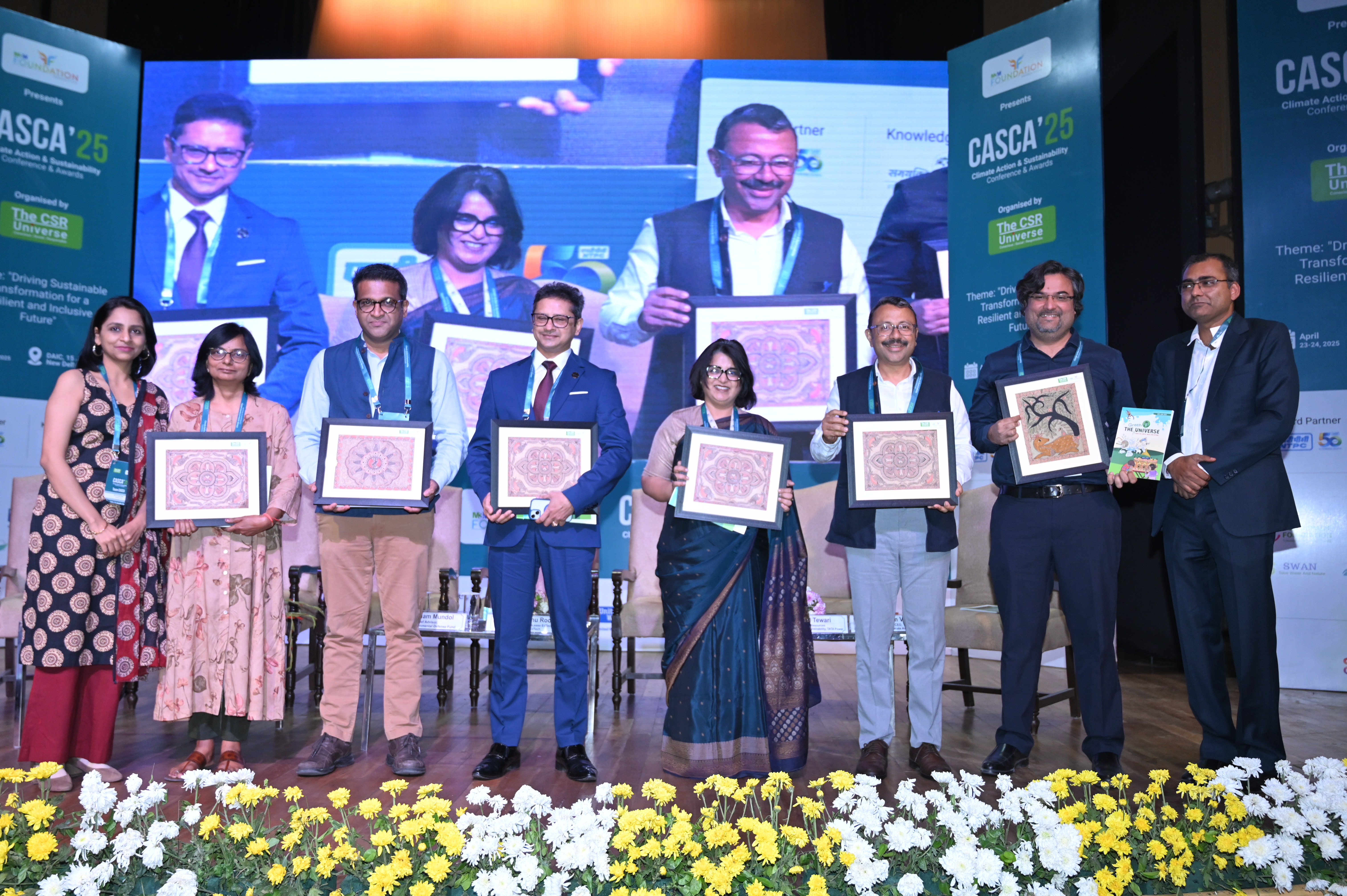
Conclusion: The Green Wave is Here—But Only If We Train for It
From Ayodhya’s ITIs to corporate boardrooms, from policy shifts to grassroots awareness, the message was clear: India’s green transition hinges not just on innovation or regulation, but on its people. Creating a skilled, aspirational, and inclusive green workforce isn’t a luxury—it’s the only way forward.
As the panelists demonstrated, the journey ahead is complex but achievable. By aligning policy, education, and industry, and by ensuring that no young Indian is left behind, India can indeed lead the global sustainability workforce revolution—one green job at a time.








.jpg)

